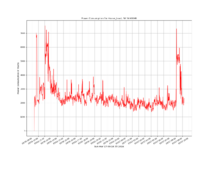wpns
Solar Joules are catch and release
Your best bet is to know for sure what your typical day profile looks like, here's mine:Thanks for all the information, a trove of ideas. I should have mentioned I'm in the USA, Southern California. My house is 100+ years old, small, and I'm not sure the roof would support solar panels. It looks like a power audit is my first move...and could someone define "constant load" for me. If it's what it sounds like, then the only thing I have that's constantly on is my computer, router, and modem. The refrigerator is off and on, does that count as constant load?

You can see it never gets below probably 1500 watts, so that's my baseline. It averages 2430 watts and peaks over 7000 watts (clothes dryer, hot water heater, kitchen appliances). [Ignore the details, this is an example, we use a crazy amount of power, mostly because it's 'free'.]
So now I know (for this day), what my inverter size needs to be (8KW minimum), what my battery size needs to be (60 KWHR*), and that I need 12KW of solar panels (60 KWHR divided by my average 5.2 peak hours of daily sunlight).
How you get the above is up to you, mine is bespoke from some esoteric hardware, but I've been doing this for a long time. Sense or other cheap monitors can give you a rough idea of your daily profile, and then you can confirm with your power bill (which will tell you how many KWHR you use in a month, divide by 31.25 to get your daily _AVERAGE_. You can get a clamp-on ammeter, turn on every appliance in the house, and read peak amps and guess at peak power.
Don't forget to round up and add more of the cheap stuff. Panels are cheap, max out your roof or ground mount, too much power production is a good problem to have. Batteries are expensive, though coming down in price, so buy (or build, see the whole forum topic on DIY batteries if you are so inclined) an expandable system that you can add onto later. Likewise, get an inverter that you can parallel later if you decide an all-electric kitchen is 'best' for you.
If the costs start to get out of control, add a small backup generator into the mix, 4 days of battery will cost a lot more than a small Honda inverter generator (to say nothing of the other cheaper brands out there) and a few gallons of gasoline. The Honda EU2200 for instance will run 3.2 hours on 0.95 gallons of gas and make 5760 WH of power in that time to charge up your batteries, which trades off $1500 worth of batteries for a gallon of gasoline and a $1K generator.
(*) Yeah, the battery size can be reduced to 'what I need to get through the night', especially if I do some load shifting (laundry during the day), but should probably be upsized to handle multiple dark days.
Your Milage Will Vary, but it all starts with an audit.


